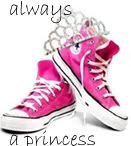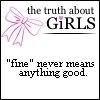|
Chasing RabbitsNot really a rant, more like a ramb...
ControlIf its something I want, why do I fight it?... You Are Absinthe!You have a unique personality. Al... You Are Ariel!Headstrong and fiesty. You have a mi... You Are Raspberry Chocolate Lip GlossYou tend to a... Dear Diary,I don't know why I am feeling so restle... Jumbled Thoughtsa jumbled rant by elana Pixi helpe... She is yours to hold in your cupped hands,to guard... Dear Diary,Last night I actually went to bed early... Reality Shows by Zodiac SignsJust for fun, let's i...

September 2006
October 2006 November 2006 December 2006 January 2007 February 2007 March 2007 April 2007 May 2007 June 2007 July 2007 August 2007 September 2007 October 2007 November 2007 December 2007 January 2008 February 2008 March 2008 April 2008 May 2008 June 2008 July 2008 September 2008 March 2009  ~Paris Hilton that’s just fabulous. ~Sex in the City music of your soul. ~Katharine Hepburn ~Margaret Cho ~Henry James
|
Tuesday, October 24, 2006 A Deeper Look at Elana People think they really know me, my thoughts, and what kind of person I am because I tend to appear friendly. I have the tendacy to put others at ease and am sincerely interested in other people's feelings and going-ons. However, not many people truly understand what makes me tick. Pixi understands me, always. It doesn't matter my mood or level of emotional stress, pixi always understands and helps me get down to the nitty-gritty of whats going on and what I'm feeling.Hopefully, this post will help serve as a decoder ring, of sorts, for others who want to get to know elana a bit better. So sit back, take notes, and while you receive a guided tour of elana's personality (according to Jung-Meyers Briggs).  Healer Idealists are abstract in thought and speech, cooperative in striving for their ends, and informative and introverted in their interpersonal relations. Healer present a seemingly tranquil, and noticeably pleasant face to the world, and though to all appearances they might seem reserved, and even shy, on the inside they are anything but reserved, having a capacity for caring not always found in other types. They care deeply-indeed, passionately-about a few special persons or a favorite cause, and their fervent aim is to bring peace and integrity to their loved ones and the world. Healers have a profound sense of idealism derived from a strong personal morality, and they conceive of the world as an ethical, honorable place. Indeed, to understand Healers, we must understand their idealism as almost boundless and selfless, inspiring them to make extraordinary sacrifices for someone or something they believe in. The Healer is the Prince or Princess of fairytale, the King's Champion or Defender of the Faith, like Sir Galahad or Joan of Arc. Healers are found in only 1 percent of the general population, although, at times, their idealism leaves them feeling even more isolated from the rest of humanity. Healers seek unity in their lives, unity of body and mind, emotions and intellect, perhaps because they are likely to have a sense of inner division threaded through their lives, which comes from their often unhappy childhood. Healers live a fantasy-filled childhood, which, unfortunately, is discouraged or even punished by many parents. In a practical-minded family, required by their parents to be sociable and industrious in concrete ways, and also given down-to-earth siblings who conform to these parental expectations, Healers come to see themselves as ugly ducklings. Other types usually shrug off parental expectations that do not fit them, but not the Healers. Wishing to please their parents and siblings, but not knowing quite how to do it, they try to hide their differences, believing they are bad to be so fanciful, so unlike their more solid brothers and sisters. They wonder, some of them for the rest of their lives, whether they are OK. They are quite OK, just different from the rest of their family-swans reared in a family of ducks. Even so, to realize and really believe this is not easy for them. Deeply committed to the positive and the good, yet taught to believe there is evil in them, Healers can come to develop a certain fascination with the problem of good and evil, sacred and profane. Healers are drawn toward purity, but can become engrossed with the profane, continuously on the lookout for the wickedness that lurks within them. Then, when Healers believe they have yielded to an impure temptation, they may be given to acts of self-sacrifice in atonement. Others seldom detect this inner turmoil, however, for the struggle between good and evil is within the Healer, who does not feel compelled to make the issue public. Full descriptions of the Healer and Idealists are in People Patterns or Please Understand Me II Princess Diana is an example of a Healer Idealist.  Healers never seem to lose their sense of wonder. One might say they see life through rose-colored glasses. It's as though they live at the edge of a looking-glass world where mundane objects come to life, where flora and fauna take on near-human qualities. Healer children often exhibit this in a 'Calvin and Hobbes' fashion, switching from reality to fantasy and back again. With few exceptions, it is the NF child who readily develops imaginary playmates (as with Anne of Green Gables's "bookcase girlfriend"--her own reflection) and whose stuffed animals come to life like the Velveteen Rabbit and the Skin Horse: "...Generally, by the time you are Real, most of your hair has been loved off, and your eyes drop out and you get loose in the joints and very shabby. But these things don't matter at all, because once you are Real you can't be ugly, except to people who don't understand..." (the Skin Horse) Healers have the ability to see good in almost anyone or anything. Even for the most unlovable the Healer is wont to have pity. Of course, not all of life is rosy, and Healers are not exempt from the same disappointments and frustrations common to humanity. As others tend to have a sense of failed competence, Healers struggle with the issue of their own ethical perfection, e.g., performance of duty for the greater cause. A Healer friend describes the inner conflict as not good versus bad, but on a grand scale, Good vs. Evil. Luke Skywalker in Star Wars depicts this conflict in his struggle between the two sides of "The Force." Although the dark side must be reckoned with, the Healer believes that good ultimately triumphs. Some Healers have a gift for taking technical information and putting it into layman's terms. Brendan Kehoe's Zen and the Art of the Internet is one example of this "de-jargoning" talent in action. Healers live primarily in a rich inner world of introverted Feeling. Being inward-turning, the natural attraction is away from world and toward essence and ideal. This introversion of dominant Feeling, receiving its data from extraverted intuition, must be the source of the quixotic nature of these usually gentle beings. Feeling is caught in the approach- avoidance bind between concern both for people and for All Creatures Great and Small, and a psycho-magnetic repulsion from the same. The "object," be it homo-sapiens or a mere representation of an organism, is valued only to the degree that the object contains some measure of the inner Essence or greater Good. Doing a good deed, for example, may provide intrinsic satisfaction which is only secondary to the greater good of striking a blow against Man's Inhumanity to Mankind. Healers face outward, greeting the world on behalf of Feeling. What the observer usually sees is creativity with implied good will. Intuition spawns this type's philosophical bent and strengthens pattern perception. It combines as auxiliary with introverted Feeling and gives rise to unusual skill in both character development and fluency with language--a sound basis for the development of literary facility. If others aspire to word mechanics, Healers would be verbal artists. A Healer’s sensing is introverted and often invisible. This stealth function in the third position gives Healers a natural inclination toward absent- mindedness and other-worldliness, however, Feeling's strong people awareness provides a balancing, mitigating effect. This introverted Sensing is somewhat categorical, a subdued version of SJ sensing. In the third position, however, it is easily overridden by the stronger functions. The Healer may turn to inferior extraverted Thinking for help in focusing on externals and for closure. Healers can even masquerade in their “professional” business suit, but not without expending considerable energy. The inferior, problematic nature of a Healer’s Extraverted Thinking is its lack of context and proportion. Single impersonal facts may loom large or attain higher priority than more salient principles which are all but overlooked.  Labels: elana 
|
          
A Submissive's Musings
Brazen Burnette Butterfly Temptress Confessions of an English Gentleman Evolution of a fucktoy by Ricks_toy His Pixie Her little girl LilJgrrl and SirG Possessive Magic Sable's Journey Submissive Reflections Urban Gypsy
Crocheting
Dog Whisperer Discovery Channel Fibromyalgia Information Hockey Knitting Meerkat Manor Neopets Pet Adoption Profile Pitstop
~His Pixie~ my best fairy friend who dazzled up this template with her fabulous pixie dust and imagination.
|
